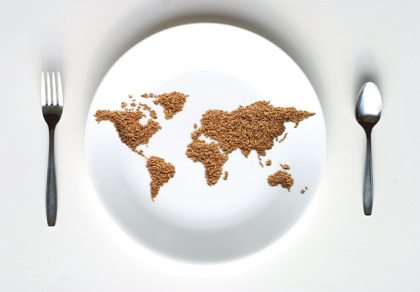In his report to the U.N. Human Rights Council, author Olivier De Schutter boldly wrote, “Food sovereignty is a condition for the full realization of the right to food.” He explicitly took aim at big corporations, warning that “the current food systems are efficient only from the point of view of maximizing agribusiness profits,” and added that “[a]t the local, national and international levels, the policy environment must urgently accommodate alternative, democratically-mandated visions.”
 We concur that this is the correct position against corporate control of our food. It is a position that is unnerving to agricultural economists who claim efficiency is necessary to feed world populations under stress and that only industrial agricultural and capitalism can meet future demands in food security. The Good Food/Healthy People/Just Economies idea is troublesome to them because it goes to the heart and soul of something less quantifiable — that is, the democratic right of an individual to decide not only what and how to eat but to have something to do directly with their own food procurement. Food is thus more than a commodity in a capitalistic system dominated by a corporate food hierarchy, one not elected by the people.
We concur that this is the correct position against corporate control of our food. It is a position that is unnerving to agricultural economists who claim efficiency is necessary to feed world populations under stress and that only industrial agricultural and capitalism can meet future demands in food security. The Good Food/Healthy People/Just Economies idea is troublesome to them because it goes to the heart and soul of something less quantifiable — that is, the democratic right of an individual to decide not only what and how to eat but to have something to do directly with their own food procurement. Food is thus more than a commodity in a capitalistic system dominated by a corporate food hierarchy, one not elected by the people.
Perhaps food freedom of choice is out of line with recent cases decided by the US Supreme Court in a present government that sides with big business and supports the control of resources by capital. But food democracy is at the top of conversations in many other parts of the world right now where it is actively being fought for. Food freedom also remains strong as an alternative platform to combat the dominant, corporate controlled, and technologically-driven unhealthy food system operating in America.
It is further our opinion at GoodFood World that the active, alternative food movement in the US is consolidating in its fight against corporate food dominance and control. Together, we will not tolerate the complete industrialization of agriculture accompanied by the total incorporation of our food. With this in mind, doing our part, our most pressing immediate mission is to help fortify independent organic growers, processors, distributors, and retailers of food to make them vital and competitive.
Our main bargaining chip is food quality – it is something corporations and technocrats cannot duplicate so must destroy outright and replace deviously through false advertising, price destabilization, pressure marketing, and fallacious regulation and direct buy-offs (and of course, under-the-table persuasions).
The intrinsic quality of the food system we uphold is reinforced by humane practices throughout; by fair and equitable agreements with farm/food workers, by respect for and restoration of natural ecosystems, by humane treatment of animals, and by collaborative and distributional structures that share resources sustainably, spread assets, and bring health.
 There is no question in our minds about what is the “right thing to do.”
There is no question in our minds about what is the “right thing to do.”
What’s in our way? Corporate money wherever you look, a justice system that has legitimized corporate monopolies and empowered them as “individuals,” and a US Congress that does their bidding. Still, wherever we remain food free, we are the people.
Listen to what Jim Gerritsen, Wood Prairie Farm, Bridgewater ME, had to say when he spoke to the UN on Earth Day 2014, giving a farmer’s perspective on the advantages and challenges facing organic agriculture today in an era of declining resource availability, heightened corporate domination of agriculture, and farming systems challenged by the effects of climate change:
(Photo of Jim Gerritson by Lottie Hedley)
